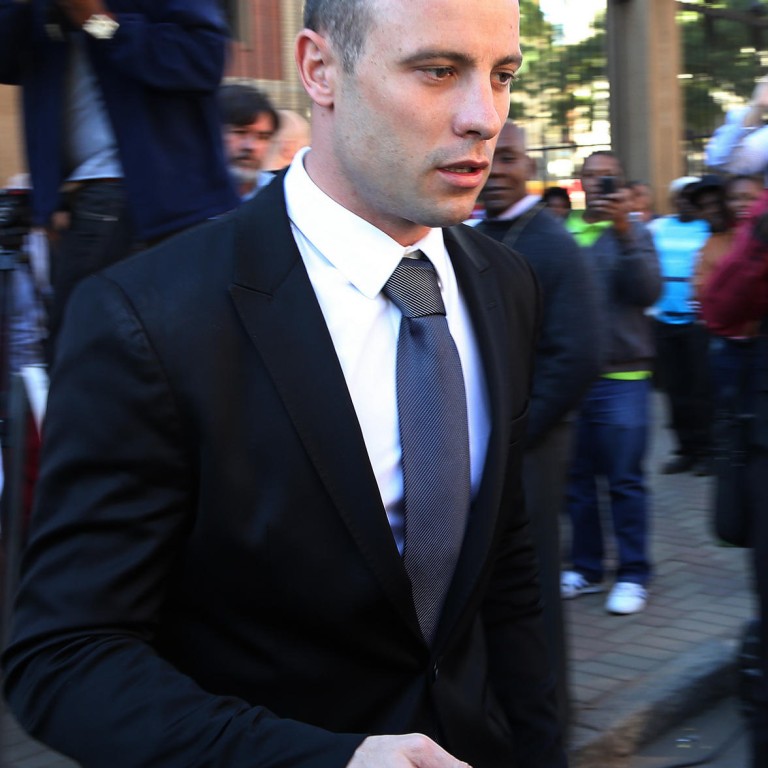
Prosecution calls for Oscar Pistorius to have month of psychiatric tests
Prosecutors will apply to have Oscar Pistorius committed for one month of mental evaluations after a psychiatrist told his murder trial the Paralympian suffered from an "anxiety disorder".
Prosecutors will apply to have Oscar Pistorius committed for one month of mental evaluations after a psychiatrist told his murder trial the Paralympian suffered from an "anxiety disorder".
Prosecutor Gerrie Nel argued the sprinter should go to a facility for 30 days to test a defence psychiatrist's claim that the condition may have had an impact on his state of mind before he shot and killed his girlfriend, allegedly believing she was an intruder.
Opening the eighth week of evidence yesterday, defence lawyer Barry Roux called forensic psychiatrist Meryll Vorster to testify about the athlete's feelings of vulnerability.
"It is my opinion, my lady, that Mr Pistorius has an anxiety disorder," said Vorster, recounting stressful factors in the Paralympic gold medallist's life.
"If he was afraid that there was an intruder, then certainly having a generalised anxiety disorder would have affected the way he reacted to that fear," she added.
During two months of trial, the defence has sought to portray Pistorius, 27, as almost manically obsessed with safety after a difficult childhood and in the face of high crime levels in South Africa.
Pistorius claims he mistakenly shot 29-year-old girlfriend Reeva Steenkamp through a locked toilet door, believing she was an intruder in his upmarket Pretoria home.
The athlete, nicknamed the Blade Runner for his prosthetic limbs, has pleaded not guilty to intentionally killing Steenkamp, as well as three other firearms charges.
If found guilty of premeditated murder, Pistorius faces 25 years in South Africa's notoriously brutal jails and an abrupt end to his once glittering sporting career.
Vorster, who also interviewed Pistorius's close family and friends to compile her report, said the athlete's anxiety disorder was brought on by an unstable childhood and the "traumatic assault" of having his lower legs amputated as a baby.
Pistorius was born without fibulas in his lower legs, leading to amputation at the age of 11 months.
Vorster said that because the surgery was at such a young age, it would have been impossible to reason with the baby, making the psychological scars much deeper. "He was too young to understand why," Vorster said. "His mother could not have comforted him because he was pre- language phase. It would been perceived as traumatic assault."
The Pistorius children were not "soothed" by their mother, Sheila, who slept with a firearm under her pillow and "abused alcohol intermittently", continued the psychiatrist.
"The children were reared to see their external environment as threatening," said Vorster, who said Pistorius's mother "added" to her children's anxiety.
As the psychiatrist was giving her testimony, Pistorius appeared to become emotional, his face turning red.
When Pistorius's mother died when he was a teenager he lost his only adult role model, said the psychiatrist. His parents were divorced at the time.
At age 21, a rising athletic star, Pistorius "broke all ties with his father", she said. Soon after, he bought a gun.
"Individuals with an anxiety disorder work hard to control their environmentin a way, his strict training regime and his diet helped him to alleviate his levels of anxiety," said Vorster.
Talking specifically about the shooting of Steenkamp, Vorster said Pistorius was more likely to try and "fight" what he thought was an intruder than run away, because his disability meant it was harder for him to flee.
Pistorius was on his stumps when he fired four times through the toilet stall door with his licensed 9mm pistol, killing Steenkamp.
